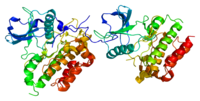
Photo from wikipedia
BackgroundAs one of the major treatment obstacles in Philadelphia chromosome-positive acute lymphoblastic leukemia (Ph+ALL), relapse of Ph+ALL may result from the persistence of leukemia-propagating cells (LPCs). Research using a xenograft… Click to show full abstract
BackgroundAs one of the major treatment obstacles in Philadelphia chromosome-positive acute lymphoblastic leukemia (Ph+ALL), relapse of Ph+ALL may result from the persistence of leukemia-propagating cells (LPCs). Research using a xenograft mouse assay recently determined that LPCs were enriched in the CD34+CD38−CD58− fraction in human Ph+ALL. Additionally, a cohort study demonstrated that Ph+ALL patients with a LPCs phenotype at diagnosis exhibited a significantly higher cumulative incidence of relapse than those with the other cell phenotypes even with uniform front-line imatinib-based therapy pre- and post-allotransplant, thus highlighting the need for novel LPCs-based therapeutic strategies.MethodsRNA sequencing (RNA-Seq) and real-time quantitative polymerase chain reaction (qRT-PCR) were performed to analyze the gene expression profiles of the sorted LPCs and other cell fractions from patients with de novo Ph+ALL. In order to assess the effects of the selective BCR–ABL and/or Janus kinase (JAK)2 inhibition therapy by the treatment with single agents or a combination of ruxolitinib and imatinib or nilotinib on Ph+ALL LPCs, drug-induced apoptosis of LPCs was investigated in vitro, as well as in vivo using sublethally irradiated and anti-CD122-conditioned NOD/SCID xenograft mouse assay. Moreover, western blot analyses were performed on the bone marrow cells harvested from the different groups of recipient mice.ResultsRNA-Seq and qRT-PCR demonstrated that JAK2 was more highly expressed in the sorted LPCs than in the other cell fractions in de novo Ph+ALL patients. Combination treatment with a selective JAK1/JAK2 inhibitor (ruxolitinib) and nilotinib more effectively eliminated LPCs than either therapy alone or both in vitro and in humanized Ph+ALL mice by reducing phospho-CrKL and phospho-JAK2 activities at the molecular level.ConclusionsIn summary, this pre-clinical study provides a scientific rationale for simultaneously targeting BCR–ABL and JAK2 activities as a promising anti-LPCs therapeutic approach for patients with de novo Ph+ALL.
Journal Title: Journal of Translational Medicine
Year Published: 2017
Link to full text (if available)
Share on Social Media: Sign Up to like & get
recommendations!